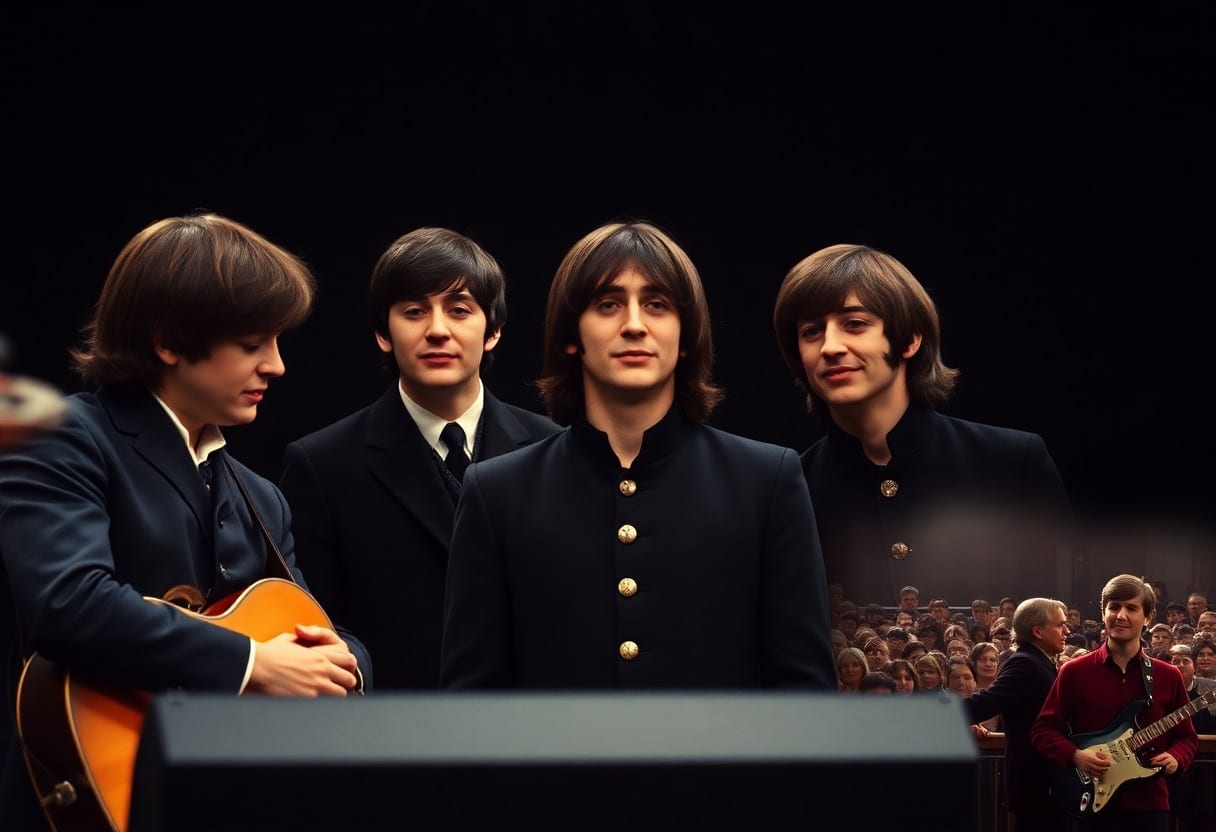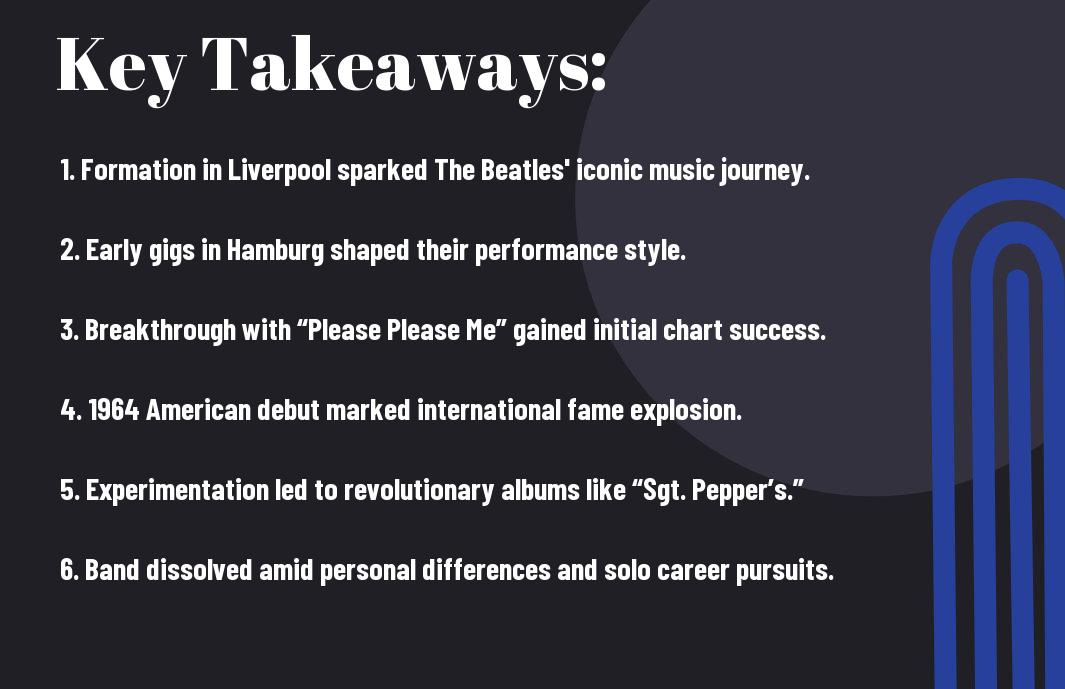You are about to discover the captivating story of The Beatles, a band that not only transformed music but also shaped culture around the globe. In this blog post, I will take you through 10 significant milestones in their remarkable journey, from their humble beginnings in Liverpool to their astronomical rise to fame, and ultimately, their dramatic decline. Each step reveals the challenges they faced and the lasting impact they made, providing you with insights into one of the most iconic groups in history.
The Early Days in Liverpool
Your understanding of The Beatles’ incredible journey starts in their hometown, Liverpool. In the late 1950s, this vibrant port city became the backdrop for the birth of a musical revolution. Featuring a mix of working-class neighborhoods and rich cultural influences, Liverpool provided an environment ripe for creativity, inspiring John, Paul, George, and Ringo to carve out their unique sound and identity.
The Formation of the Band
Days after meeting in a church festival in 1957, John Lennon and Paul McCartney began to collaborate, eventually bringing in George Harrison and Ringo Starr. Their shared passion for music and desire to make it big led to the formation of a band that would change not just the music world but also cultural landscapes around the globe.
Influences and Musical Style
Early inspiration for The Beatles came from a variety of genres, including rock, pop, folk, and rhythm and blues. Their eclectic musical style reflected the diverse influences from artists like Buddy Holly, Chuck Berry, and Elvis Presley, setting the stage for their innovative sound.
But the journey to define their musical style wasn’t without challenges. As they experimented with sounds and lyrics, they drew heavily on American rock and roll while also integrating British influences. This blend allowed them to develop a unique sound that resonated with audiences worldwide. Their commitment to pushing boundaries and embracing changes in musical trends helped them craft hits that were both commercial successes and artistic masterpieces, paving the way for future generations of musicians.
First Breakthrough: “Please Please Me”
There’s a defining moment in The Beatles’ early career when they recorded their debut single, “Please Please Me.” This catchy tune marked their first major step into the music industry and showcased their distinctive sound. Not only did it capture the essence of Beatlemania, but it also laid the foundation for their monumental journey ahead, drawing attention from across the UK and beyond.
Recording and Release
Beside the vibrant energy of their live performances, The Beatles entered the studio to record “Please Please Me” in February 1963. The track was produced by George Martin and featured a dynamic blend of harmonies and rhythms that highlighted the band’s talent. Released on March 11, 1963, it quickly garnered radio play, setting the stage for their skyrocketing fame.
Initial Success
An overwhelming response followed the release of “Please Please Me,” marking a pivotal point for The Beatles. The single reached number two on the UK charts and earned significant airplay, demonstrating their growing popularity. This initial success fueled their ambition, as they transitioned from local performers to national sensations, with fans eagerly awaiting their next move.
This unprecedented success was a game-changer for The Beatles. The overwhelming enthusiasm of their supporters led to increasing opportunities, including a series of live performances and further record deals. As “Please Please Me” climbed the charts, it not only solidified their place in music history but also marked the beginning of a cultural phenomenon. The excitement surrounding their fresh sound sparked an era of Beatlemania, forever altering the landscape of popular music and setting the stage for their future triumphs.
The Rise of Beatlemania
After their explosive debut in the early 1960s, the Beatles quickly captured the hearts of millions, ushering in a cultural phenomenon known as Beatlemania. This intense fan frenzy was characterized by screaming crowds, obsessive admiration, and an unprecedented level of fame that transcended music. As I examine into this exciting period, you’ll discover how a group of four young men from Liverpool became global icons and fundamentally changed the landscape of popular music.
Touring and Fan Frenzy
Among their first major experiences were the frantic tours where they performed in front of euphoric fans who would scream, cry, and nearly faint at the sight of them. In cities like London and Paris, their concerts drew massive crowds, resulting in chaotic scenes reminiscent of a modern-day rock festival. I find it fascinating to see how their energetic performances and charismatic personalities ignited a frenzy that was both thrilling and overwhelming.
Media Attention
An undeniable aspect of Beatlemania was the intense media coverage the band received. Newspapers and television networks couldn’t get enough of them, often showcasing their antics and music. It felt as if the world was spinning around them, with every moment and every song dissected. The media’s fixation helped to elevate their status, pushing their music to the forefront of cultural conversations.
Consequently, the Beatles became a significant subject for newspapers, magazines, and television programs, with headlines often portraying their every move. This media exposure proved to be both a blessing and a burden; it influenced their rising fame while also bringing startling challenges. The public obsession led to heightened scrutiny, and as you read more, you’ll see how it forced them to navigate the balance between artistic expression and overwhelming celebrity. As their popularity soared, the constant media attention often made every street corner a potential scene for the intense fan interactions, sometimes leading to dangerous situations during events. But with every challenge, their music continued to resonate, solidifying their legacy.
Musical Evolution: Sgt. Pepper’s and Beyond
Keep in mind that The Beatles’ transition to more experimental sounds marked a significant turning point in their artistic journey. With the release of ‘Sgt. Pepper’s Lonely Hearts Club Band’ in 1967, they not only redefined pop music but also blurred the lines between various genres. This album showcased their innovative use of studio techniques, diverse instrumentation, and rich lyrical content, paving the way for future artists to push the boundaries of mainstream music.
Experimentation and Innovation
At the heart of The Beatles’ evolution was their commitment to experimentation and innovation in music production. They embraced new technologies, weaving in non-traditional instruments, such as the sitar and orchestral arrangements, which fundamentally transformed the soundscape of popular music. This adventurous spirit led to groundbreaking albums that encouraged listeners to view music as an evolving art form.
Cultural Impact
On a broader scale, The Beatles not only influenced music but also had a profound cultural impact. Their work ignited social movements, shifting attitudes towards art, fashion, and the very notion of celebrity. They became emblematic of the counterculture, inspiring generations to challenge norms and express individuality through creativity.
To understand their cultural impact, one must appreciate how The Beatles’ music was intertwined with social issues of the 1960s, from the civil rights movement to the anti-war protests. They used their platform to voice revolutionary ideas and foster a spirit of change, embedding their values into the fabric of society. Their impact resonates to this day, as contemporary artists still draw from their groundbreaking styles and messages, showcasing the enduring legacy of The Beatles as both musicians and cultural icons.
Challenges and Changes
Not everything in The Beatles’ journey was smooth sailing; they faced significant challenges that led to transformative changes within the band. As they progressed, the pressures of fame and the weight of their own expectations began to strain relationships, igniting issues that would ultimately shape their musical direction and individual paths.
Internal Conflicts
The dynamics between the band members grew increasingly complex, as personal ambitions and creative differences emerged. I can see how John and Paul, despite their legendary collaboration, often found themselves at odds over the musical direction, leading to tensions that threatened their unity.
Influence of Outside Forces
Across the years, The Beatles were not only influenced by their internal struggles but also by external pressures ranging from media scrutiny to socio-political movements. I believe these outside forces shaped their music, pushing them to explore new themes and sounds as they navigated a rapidly changing world.
Forces beyond their control played a significant role in molding The Beatles’ legacy. The intense media pressure often painted them in a spotlight that was both alluring and suffocating. Events like the political upheavals of the 60s and the rise of counterculture movements ignited their songwriting, inspiring lyrics that resonated with a generation. Additionally, external conflicts, such as fan unrest and legal battles, contributed to the band’s eventual split. It’s clear that their journey was as much a reflection of their times as it was of their talents.
The Final Years
Now, as I reflect on the tumultuous final years of The Beatles, it’s evident that the band faced significant challenges that marked the end of an era. From creative differences to personal conflicts, their once seamless collaboration began to fray. Despite the strains, they continued to produce groundbreaking music, leaving an indelible impact on the world. The signs of the band’s impending dissolution were clear as they navigated fame, friendship, and the pressures of the industry.
Last Album and Breakup
About the time they released their final studio album, “Let It Be,” tensions among the members were palpable. The creative discord reached a peak during the recording sessions, which contributed to their eventual breakup. Despite this, the album remains a poignant reminder of their genius, even if it signaled the end of their legendary partnership.
Solo Careers
After The Beatles disbanded, each member ventured into solo careers, showcasing their unique talents and artistic directions. Their individual journeys not only highlighted their musical prowess but also revealed their personal struggles and growth as artists. This transition marked a new chapter in their lives, demonstrating that while The Beatles may have ended, the legacy of each member lived on.
Even though the breakup was a period of personal and artistic turmoil, the solo careers of John, Paul, George, and Ringo blossomed in diverse and remarkable ways. John Lennon and Yoko Ono’s collaboration produced iconic works, such as “Imagine,” which resonated with audiences worldwide. Paul McCartney formed Wings, achieving commercial success with hits like “Band on the Run.” Meanwhile, George Harrison explored spirituality, releasing the critically acclaimed “All Things Must Pass.” Ringo Starr’s lighthearted approach to music included hits like “Photograph.” This new phase illuminated their individual creativity, proving that their talents extended beyond the collective identity of The Beatles.
Summing up
Drawing together the incredible journey of The Beatles, I can see how their rise to fame was marked by key milestones that defined not only their music but also the cultural landscape of their time. From their formation in Liverpool to their groundbreaking albums and final split, each step reveals the evolution of a band that changed the world. As you reflect on their impact, you’ll appreciate how their innovative spirit and timeless melodies continue to resonate with fans across generations, solidifying their legacy as one of the greatest musical groups in history.












